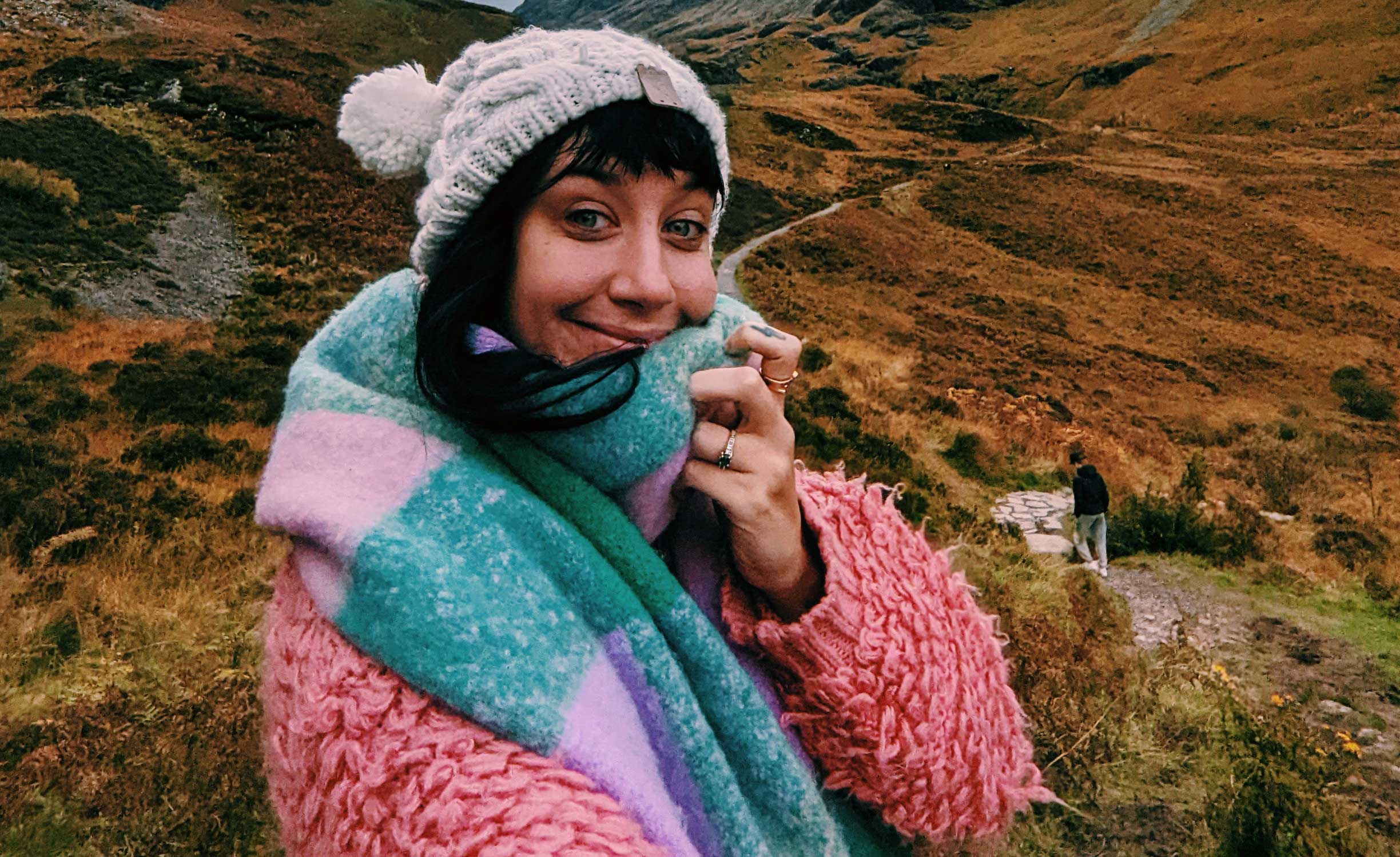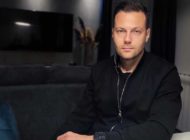“The sky is the limit when we have a strong why and we live a life that’s truly aligned with who we are and what we value ” – Charlotte Anaïs, freelance translator and author
In each issue, Freelance Life Magazine presents interesting freelancers with different occupations. This time we go to Paris, France, and present Charlotte Anaïs, freelance translator and author.
Charlotte is 29 years old and lives in Paris, France. She is French and grew up speaking only French in small town in Normandy and then Lorraine, before studying Translation in Brussels and London. Her life has always been very unconventional. She has been working as a freelance translator (from English and Russian to French) for the past five years now. Charlotte is also a writer, and in free time travel a lot, wander around Paris, and practice yoga and roller skating.
– How did you become interested in the job of translator?
I always had a deep love and fascination for languages and foreign cultures: when I was a child, my hobbies were reading bilingual dictionaries, bilingual books and watching my favourite shows in English with subtitles. I have also always loved writing, so Translation naturally fit my personality.
– What skills and education are required for someone to do this job?
Related Posts:
I hold a BA in Translation from the Higher Institute for Translators and Interpreters (now HEB) in Brussels, and it was a very demanding curriculum. We not only had language and linguistic classes in all languages learned but we also had modules such as world history, philosophy, art history, economics, law, science… The aim was to provide us with a solid general knowledge, since it’s essential for a career as a translator. A degree in languages would be the most straightforward path to becoming a translator. The skills required to succeed at this job are a deep understanding of the complexity of language and cultures, continual professional improvement, reading frequently in all your working languages, having perfect grammar and writing skills, conducting extensive research, and paying close attention to detail. It’s not uncommon to spend a LOT of time finding THE perfect word – which is so fun if you’re a true linguist at heart.
– Today there are a lot of translation software, how far are they from a high-quality translation?
I can always spot right away a non-edited machine translation. Translation software don’t pick up on the nuances and complexity of the human language. No machine will ever be able to grasp the very real complex emotion of human thought and speech; especially when it comes to literary form. Translation is not a mathematical equation: language is about emotion and that’s something only a human can convey.
– You have a lot of interests – spirituality, business, travel, health, and wellness. Do you have time to devote yourself to all these interests?
I make time to devote myself to my interests. Not too long ago, I barely did and it actually resulted in me going through burn out. Now, I make sure to take time throughout the day to reconnect to who I am outside of my freelance business. The human behind the emails. I have a solid morning and evening routine, without my phone or computer, and traveling every month is one of my top priorities. Each day, it’s up to us to make time for what matters by deciding what our priorities are. I now know that me taking time to play, have fun and take care of myself makes me a better business owner.
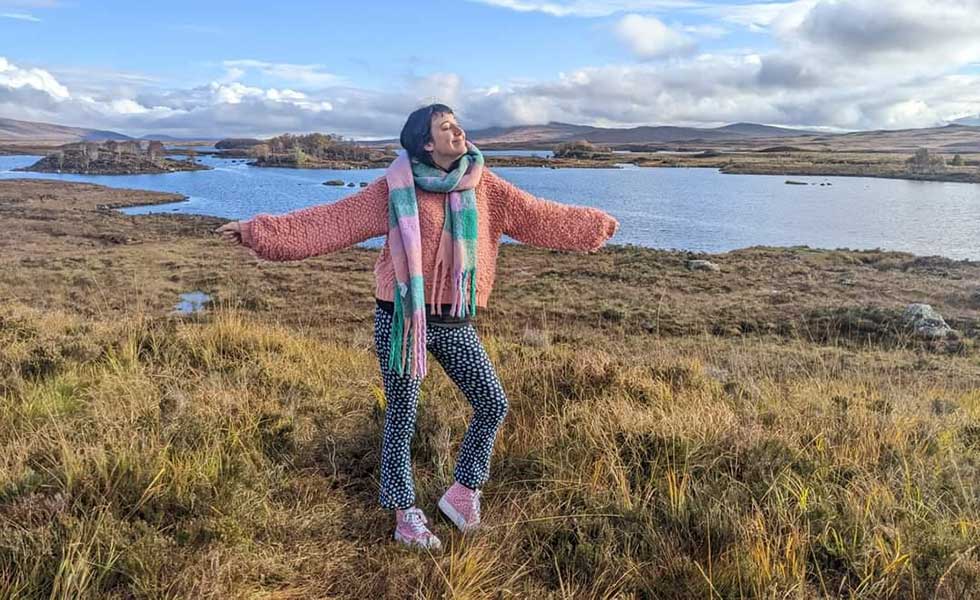
– What is the most important thing for someone to become a good translator?
Being ready for a lifetime of learning and improving, and directly experience the culture of your working languages as much as possible. I visit the UK very often and my husband is American, so I’m always connected to English-speaking cultures. I am based in Paris and evolve in France, therefore I’m also in touch with the culture of my target country, which is crucial to being a good translator.
– In your opinion, what skills does a freelancer have to have to be successful?
I think the most important skill to have is tenacity – to cultivate a growth mindset. It allows you to problem-solve, to be oriented on the solution rather than the problems when they arise, to remain optimistic in the face of uncertainty and challenges. Many other skills needed to succeed can be learned along the way thanks to this growth mindset: negotiating, time management, communication, marketing, stress management… But at the very beginning, being tenacious is required. Many people cannot see the forest for the trees when they are confronted with a problem; however, as your own boss, you don’t have the luxury of staying stuck. Self-managing is also obviously an essential skill to have, but I believe it can also be learned through developing a growth mindset. Finally, being open to constructive feedback is also very important, so that you can become a better service provider, raise those rates and get even more clients on board.
– Have you had the opportunity to work full time, or have you always wanted to be a freelancer?
I worked full time as a waitress before, never in an office. Actually, yes, I have worked as a translator in an office for a few weeks at the very beginning of my professional life and it was the worst. I felt so… out of place. It felt incredibly wrong. I quickly realized it was not for me! I then quit and found a job as a waitress while I freelanced almost full time next to that. I worked close to 80 hours a week – I don’t recommend that to everyone, but in the moment it’s what I needed to do, and I absolutely do not regret it. The last service job I had was actually empowering because I worked side by side with a quite famous business woman in one of her restaurants, and it was very inspiring to be so close to a woman my age who had made it. It solidified my belief that I could be my own boss too, and that I was closer than ever to realizing my dreams. Long story short, I was able to quit waitressing within 10 months, and have been freelancing full time since January 2019.
– What influenced you the most to start freelancing?
I’ve never shied away from a personal challenge, and freelancing seemed like the ultimate challenge. I’ve always made decisions which didn’t make sense to others. I had just moved to Liverpool, England, was fresh out of university, had spent a semester teaching French in America, and I had never wanted a desk job. I wanted to do my own thing – I wasn’t sure if I could though, because I come from a working-class background and I was never surrounded by self-employed people. I had to overcome a lot of limiting beliefs… But I was so inspired by the thrill of making my own rules and being able to grow something myself that I silenced the voices very easily!
– What are your success habits?
I have been teetotal for almost 3 years now and it’s the best decision I’ve ever made for my business and personal growth. I have a lot more confidence, I’m extremely focused, I am always clear-headed, and I have had less anxiety ever since I decided to stay away from alcohol. Another habit of mine is that I always ask myself the hard questions and the answers orient my actions. I spend a lot of my free time reading inspiring books, listening to podcasts and doing things that really make me feel alive. I aim to live life to the fullest on a daily basis. I regularly invest in myself through books, courses and events. Again, cultivating a growth and positive mindset is a top priority for me and I know that it’s what has led me this far. Each month, I decide my goals and they guide my decisions through the month. Also, upon waking up every morning, I make a mental list of 10 things I’m grateful for, and I do the same thing in the evening when I go to bed. Cultivating gratitude for what you have right now is the best way to ensure more gratitude to come. Practicing self-love and making sure I believe in myself is another one of my best success habits: when you believe you can make something happen, your creativity to reach that goal is truly unleashed. Finally, regulating my nervous system is the most crucial habit, and yoga and breathing exercises do wonders for that. Oh, and of course, I always celebrate every success, even tiny ones!
– What was the best advice you got at the beginning of your freelance career?
The best advice I got at the beginning of my freelance career was that I had to behave as the business owner I now was, not as an employee. I had to understand that companies are happy to pay me for my services because they are valuable and worthy of good compensation. That was a gamechanger for me!
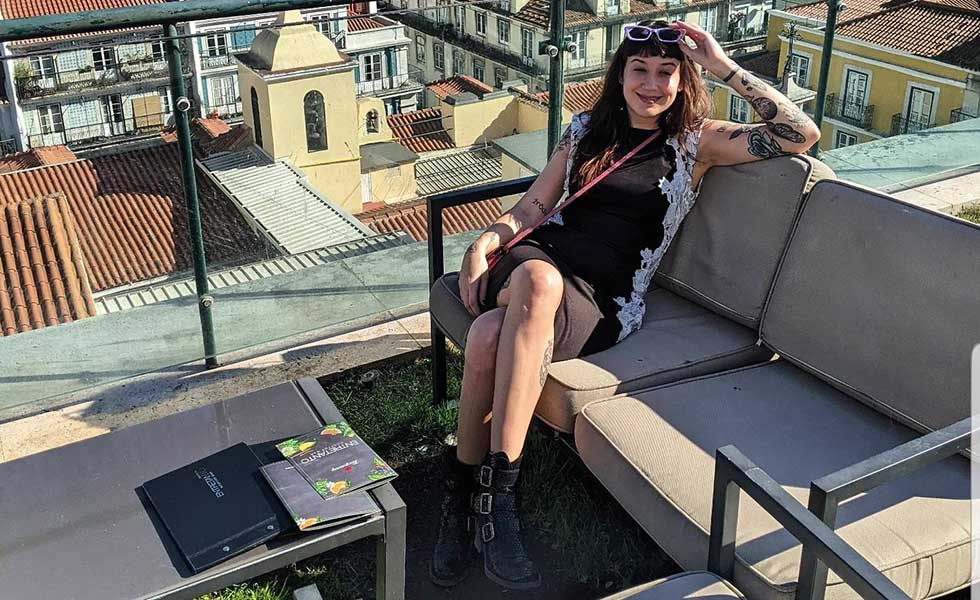
– And what’s the worst advice you’ve ever got?
That freelancers should accept every project that comes their way, at any fee, because any work is better than no work. I now regret accepting low rates for a good while at the beginning of my freelance journey. This is what caused me to freelance more than 40 hours a week next to my day job without being able to quit my job. The freelance industry is plagued by low rates, and people accepting them because they think they have to as a rite of passage is making things worse. We have bills to pay and are service providers: just because we work from home doesn’t mean our career is a hobby. The services we provide are highly valuable. We’ve spent money and time cultivating our skills so, in my opinion, we should never accept abysmally low rates, even as beginners.
– Have you worked on any freelance platform other than UpWork?
I have worked on a few freelance platforms other than Upwork, such as ProZ and Translatorscafe, which are platforms specific to translators. Actually, I don’t even go on Upwork that frequently, to be honest. I go and have a look once in a while to see if there are fun projects. I mostly get sent project offers directly from the agencies and publishing companies I collaborate with on a regular basis.
– Why has UpWork become your choice?
There are usually fun projects on UpWork and it’s great for someone like me who loves changes and stays as far away from routine work as possible. It’s also a good way to practice your elevator speech and your negotiation skills! Whenever I apply for a job, I rework it and add new things. I mostly use Upwork for fun on the side!
– What are the advantages of a freelance lifestyle for you?
The freelance lifestyle fits my personality perfectly. I love the total freedom. You can work from wherever you want, whenever you want, however you want to. You pick the projects, your rates, your clients… You’re in charge of your life and that is something I could never give up. I travel very frequently and always feel lucky beyond measure when I get to work from anywhere in the world simply with my laptop. However, I don’t like using the word lucky because there was no luck involved. I very consciously created, and worked hard for, the life I live today. On another note, the unpredictability of freelancing is actually a thrill to me. I have total faith that everything will work out best case scenario. I know many people tell me they could not handle the “instability” of freelancing, but it’s an aspect I absolutely adore and thrive off. It keeps me on my toes and life is never boring. Finally, uncapped income, being paid to work on exciting diverse projects, and being able to take a day off whenever I need to? Yes, please!
– And what are the disadvantages?
There are very stressful elements to freelancing that require a very high stress tolerance. You have a responsibility towards your clients, you have to keep them happy, you have to deliver strong results, and there is no one to help you with that – unless you decide to hire an assistant down the line. The unpredictability and instability can also be disadvantages depending on your personality type: unless you work for regular clients who give you regular work, it can be stressful to not know when they next paycheck will be. It’s all on you and that creates a big pressure sometimes. It can also be lonely: you don’t have colleagues, you don’t have anyone that can help you or to whom you can delegate the work you struggle with… You’re completely in charge. And that can be very daunting and stressful at times, which is why developing a growth mindset and regulating your nervous system is absolutely essential. Having no paid time off or sick days is also a drawback.
– What was the hardest decision you ever had to make as a freelancer?
Taking time off work when I was going through the worst of my burn out. As someone who barely ever took a day off for the first few years, it was very hard to be forced to take several weeks off this year in order to get back on my feet. It was a very hard time, but it taught me the importance of making time for yourself and to have hobbies and a personal life outside of your work. I am glad that I prioritized my mental health at that point. Burnout is not talked about enough, and the long-term effects it can have on the brain and body are actually terrifying. Luckily, my savings could cover my time off without much stress – so may this be your reminder to save a portion of your earnings for rainy days!
– In order to succeed, freelancers must also possess certain soft skills, such as communication, organization, time management… Which soft skills were the most challenging for you?
Negotiation was definitely a hard soft skill to learn. Since I come from a working-class background, I had to develop an entrepreneur mindset. Stress management and problem solving are also two things I had to learn the hard way, as someone who dealt with a high level of anxiety. But you learn that as you go, by making mistakes, learning from them, and behaving differently.
– What has benefited you the most to become a successful freelancer? Your education, certain books, courses, forums, instructions on freelance platforms or something else?
Making mistakes and learning from them is what’s benefited me the most to become a successful freelancer! I strongly believe that making mistakes is the best way to grow and become successful in the end. I also read a lot of books about success, psychology, and mindset. Two I would particularly recommend are Outwitting the Devil by Napoleon Hill and The Mountain is You by Brianna Wiest. I also regularly invest in courses and listen to podcasts every day. Mind your Business by James Wedmore and Manifestation Babe by Kathrin Zenkina are my favourites.
– If you could start all over again, what would you do differently?
I wouldn’t listen to the cacophony of uninformed opinions. I would raise my rates earlier. I wouldn’t accept some very low-paid jobs at the beginning. But overall, I would actually not change anything because again, you learn by making mistakes and I had to learn the hard way in order to make better decisions.
– What is your biggest motivation?
My biggest motivation is definitely living a life that feels amazing to me, on my own terms, by keeping my freedom: my freedom to travel, to choose the projects I dedicate my energy to, to spend time with my husband, with my family, with my friends, whenever I want to. Freedom is my number one value and what I cherish the most. My second biggest motivation is to constantly surprise myself and inspire others to live life on their own terms, too. I love sharing what I learn through the books I write and my blog.
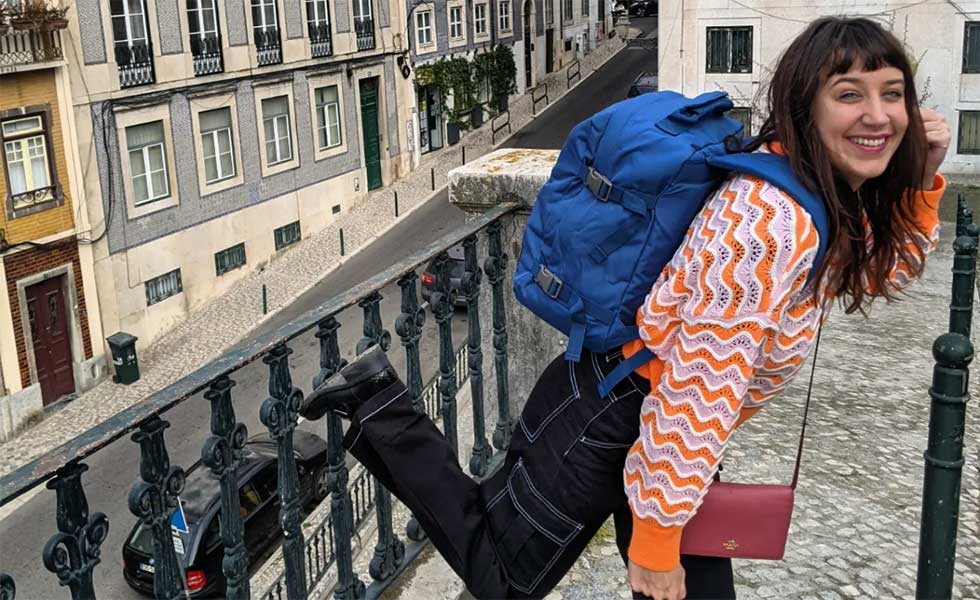
– What do you love about your job?
I love that it’s constantly evolving and constantly changing. All projects are different. I love that my job feels like an extension of me and truly allows me to grow as an individual too. I’m always learning tons.
– How important is constant professional improvement?
So important! Especially as a business owner. Constant professional improvement helps with fighting imposter syndrome and boosts your confidence. When you stay on top of your game, you’re less scared about competition and losing your clients. All the industries are rapidly evolving and changing, so it’s very important to keep that pace with your skills too.
– What are you most grateful for in your freelance journey?
I’m the most grateful for all the lessons that I could apply to my personal life, too. Being a focused, dedicated person has improved my confidence and my relationship with myself. My laptop lifestyle has allowed me to travel to beautiful places and call them home for a while. I would have never been able to see so much of the world if I were not a freelancer. I’m able to see my friends who don’t live in Paris, and my family whenever I want to. I’m also so grateful for showing myself how much I’m capable of, and that I can do really hard things. The sky is the limit when we have a strong why and we live a life that’s truly aligned with who we are and what we value.
– What is the best way to organize multiple jobs and private life?
I struggled with that for a long time. I’m a passionate individual and I brought too much of that passion into my multiple jobs. Having strong boundaries is ultimately the best way to maintain a good work life balance as a freelancer. It’s hard to say no to jobs when the more you work, the more you earn money… but we all have to say no at times. It’s even harder when you love what you do. After my burnout, I have now developed a solid structure to my days and I never work past 6pm. Also, my daily yoga is non-negotiable. So, in a nutshell: boundaries and checking in with yourself that your work isn’t taking too much space!
– If you had to single out one characteristic that is most important for the success of a freelancer, what would it be?
Developing a success and growth mindset. Read books, listen to podcasts, watch TED talks… You’ll be able to overcome any obstacle.
– What advice would you give your younger self?
You were right to not follow the herd, and to make all the crazy decisions you made! Stay weird and stay authentic to yourself. You can and will do hard things. You will get to live life your way so don’t give up and ALWAYS follow your intuition.
– The best advice for those who are considering a freelance career?
Take the leap! Make a list of your reasons why and stay focused on that. Do not listen to everyone’s opinions, protect your energy, and know that anything is possible! Mostly, listen to your gut – it never leads you astray. Finally, don’t forget to have fun and to enjoy it!
Charlotte is a freelance translator and a writer. When she is not traveling, she is based in Paris, France where she lives with her husband and her books. She has been freelancing full time since 2019 and loves inspiring others to follow their big dreams. You can find her on Instagram @roamwithcharlotte.
